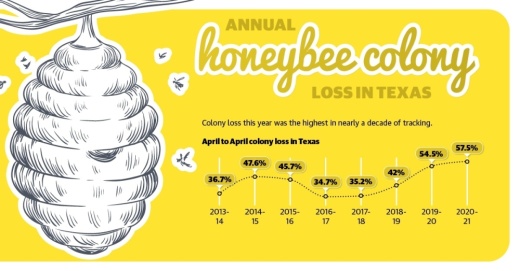A survey by the national nonprofit Bee Informed Partnership reported record-high colony losses statewide for the 2020-2021 season, which ran from March 2020 to April 2021. The Woodlands-based beekeeper Lisa Miller, a former Montgomery County Beekeepers Association board member, told Community Impact Newspaper the freeze hit her hives hard.
“The weather this year was really hard on bees,” Miller said. “Talking to local beekeepers, some of them lost 25% to 50% of their hives from that freeze. And the other problem after the freeze was that it affected a lot of the spring flowering plants.”
However, Michael Hardman, the founder of Spicy Fly Honey Bees in Tomball, said he did not experience the same losses. Additionally, Hardman said he did not take any special precautions for his bees.
“When the first freeze reports came in, I looked at [the hives] and said, ‘Good luck, guys,’” Hardman said. “And we came out of it pretty well.”
Hardman said his bees did not have trouble finding food either because they rely on the Chinese tallow tree for nectar. The tree, which is classified as an invasive species by the U.S. Department of Agriculture, can withstand cold temperatures and is attractive to honeybees.
Hardman also left enough honey in his beehives for the insects to survive, a strategy that fellow Tomball-based apiary BZ Honey relied on to maintain its populations.
In a Facebook message, BZ Honey said it left a “larger than normal” amount of honey stored, leading to its populations largely remaining intact.
However, food shortages did hit the BeeWeaver Honey Farm in Navasota, located north of Magnolia.
Co-owner Laura Weaver said although 80% of its colonies survived, the bees were too cold to be properly productive. A chilly April and a rainy May also meant BeeWeaver’s queen bees did not have good flying weather to mate, further affecting their populations.
“We were having to buy food for them because the rain and cold made it so that what flowers they could find weren’t giving them any nectar,” Weaver said. “It was a rough season.”






